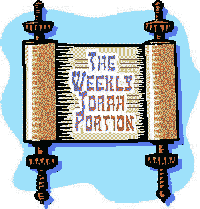Search our Archives:
» Home
» History
» Holidays
» Humor
» Places
» Thought
» Opinion & Society
» Writings
» Customs
» Misc.
|
The Search for Meaning
By Michael Chessen
The Torah portion Shmot opens the book of the same title, known in
English as Exodus, but more literally translated as "names". Whereas the
opening sections of Torah portions always dictate their titles, few
readings seem to subsequently contradict this initial justification to
the
degree that Shmot does.
While the Torah opens the story of Israel's Egyptian bondage by
restating the names of the heads of the twelve tribes, the protagonists
of
the narrative to come are strikingly nameless. The parents of Moses are
only identified as "a man from the house of Levi who went out and
married
Levi's daughter"(Exodus 2:1). In sharp contrast to Genesis' account of
the
birth of the future heads of the twelve tribes, the circumstances of
Moses'
birth do not provide him with a name. Only upon his reaching the status
of
a "lad", though still an infant, does he belatedly receive a name from
the
"nameless" daughter of Pharaoh, who "bore" (moshe) him from the water.
The most striking omission of name, however, would have to be that
of
God Himself. While the people of Israel obviously "know" the God of
their
fore-bearers despite his apparent concealment in the midst of their
bondage, Moses nevertheless feels a need for a means of "naming" or
"defining" the inherent nature of the Almighty. God's reply that Moses
tell
the people that "I Will Be Who I Will Be" (transliterated by Rabbi
Areyeh
Kaplan as YHVH) makes for less of a definition than an expressed intent
of
action.
The concept of "concealed providence" as an inherent aspect of
exile
or "galut" is something which Rabbi Yissocher Frand sees Jacob
foretelling
us when blessing Joseph's sons at the outset of the exile. Jacob here
invokes not the name of God, but His "angel who has redeemed
him"(Genesis
48:16). Whereas Abraham and Isaac had primarily benefited from God's
direct
providence, Jacob, in preparing his descendants for the nature of exile,
more fully introduced the concept of indirect guidance from above.
Clearly,
this type of providence is difficult to discern, and therefore, severely
tests our faith. However, beyond a test of our spiritual mettle, there
would seem to have been an additional important factor here in the
divine
plan for the Exodus. Maimonides states that on Passover, every
individual
is to see his or herself as having personally been redeemed from
Egyptian
bondage. The very undefined nature in the opening reading of Shmot
perhaps
sets the stage for one to "paint" one's self into the scene and more
fully
and directly appreciate the meaning and significance of our redemption.
Wishing you all a Shabbat Shalom !

|
|
Please let us know if you see something unsavory on the Google Ads and we will have them removed. Email us with the offensive URL (www.something.com)
|





|
